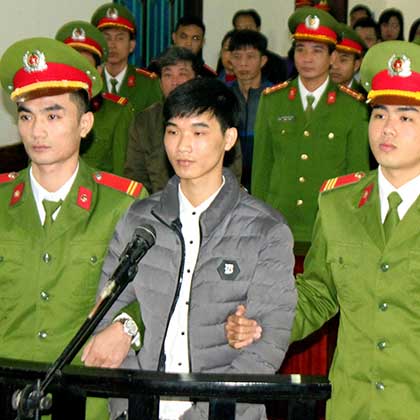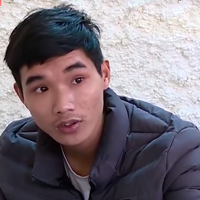

Nguyễn Văn Hoá
RFA Vietnamese Service
Jailed: January 11, 2017
Nguyễn Văn Hoá, a citizen journalist who has worked with RFA’s Vietnamese Service as a videographer, was reported missing by his family on January 11, 2017, from his home in the Hà Tĩnh Province of central Vietnam.
On November 27, 2017, at the end of a two-and-a-half-hour trial at the People’s Court of Hà Tĩnh, Hoá was sentenced to seven years in prison followed by three years of house arrest on a charge of “disseminating propaganda against the Socialist Republic of Vietnam” under article 88 of country’s penal code.
Hoá, 24, is a known activist in Vietnam, who has worked closely with the Catholic Church. He began contributing to RFA in summer 2016 as a citizen journalist. He shared videos which showed the public outcry and protests in Vietnam over the government’s silence in the wake of a chemical spill at the Formosa Hà Tĩnh Steel plant that killed tons of fish and devastated fishing communities along the country’s central coast. Hoa’s family lives in Quảng Ích—a village in the Kỳ Khang Commune, Kỳ Anh District of Hà Tĩnh Province —which was one of the areas most severely affected by toxic waste discharged from the Formosa plant spill.
Even before he was arrested and subsequently sentenced, Hoá had been beaten by police in Hà Tĩnh. On November 19, 2016, officers confiscated his equipment, including his mobile phone. He went into hiding upon his release, fearing more reprisals.
On January 23, authorities informed Hoá’s family that he had been officially detained after the family filed a petition to the provincial authorities. Police documents showed that Hoá was being held for allegedly violating Article 258 of Vietnam’s penal code – “abusing democratic freedoms to infringe on the interests of the state,” an offense that carries a maximum sentence of seven years in prison.
In April 2017, Colonel Nguyễn Tiến Nam, Deputy Director of the Hà Tĩnh police, publicly announced the charges against Hoá. According to the indictment, Hoá set up accounts on multiple social networks in order to post information to smear, distort, incite, slander the government, and slander the Party.
That same month, authorities released a short video of Hoá confessing his guilt and asking for forgiveness. In the video, he asks others to not make “the same mistakes he has done.” Police also pointed to Hoá signing a $1,500 contract with foreign media outlets to produce 16 videos per month. Though authorities did not identify Radio Free Asia, the contract terms are those in his contract with RFA.
Abusive treatment of Hoa has continued since he was sentenced in November 2017.
In August 2018, Hoa was beaten by Vietnamese authorities into making a confession against environmental activist Le Dinh Luong, who was on trial for allegedly attempting to overthrow the government. Speaking to RFA’s Vietnamese Service after the trial, Luong’s defense lawyer Ha Huy Son slammed the sentence handed down to his client, saying the court had presented “no evidence” to show that Luong had worked to overthrow the government, a charge frequently brought under Article 79 of Vietnam’s Penal Code to arrest and imprison democracy and human rights activists in the country.
“They based their decision on the testimony of two witnesses, Nguyen Van Hoa and Nguyen Viet Dung,” Son said. “But both of them have retracted what they said in earlier testimony.” “They now say that they were beaten and forced to say what they did,” he said.
Following the abuse of Hoa, the Committee to Protect Journalists condemned the actions of Vietnamese authorities. “Vietnamese authorities must stop immediately their harassment and abuse of reporter Nguyen Van Hoa,” said Shawn Crispin, CPJ’s Southeast Asia representative. “Instead of beating jailed journalists into making false confessions, Vietnamese authorities should free all journalists behind bars, reform the laws that put them there, and hold to account those who abused their power to commit this assault.”
In late February 2019, Hoa staged a 12-day hunger strike to demand that authorities formally investigate his beatings by police and prison guards. He ended his strike on March 6 after a visit from family members urging him to start eating again.
This story originally appeared on USAGM.gov.
